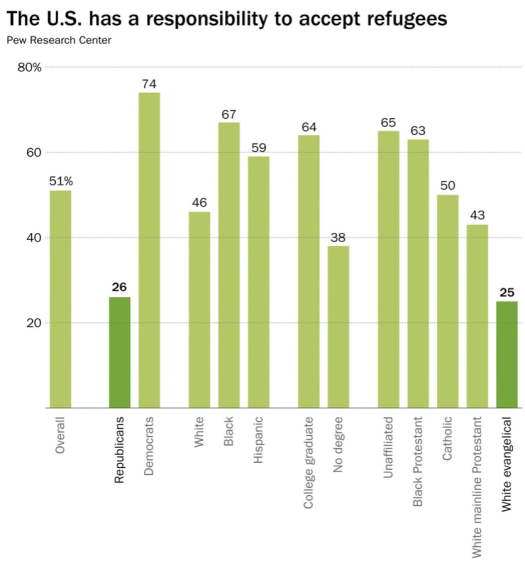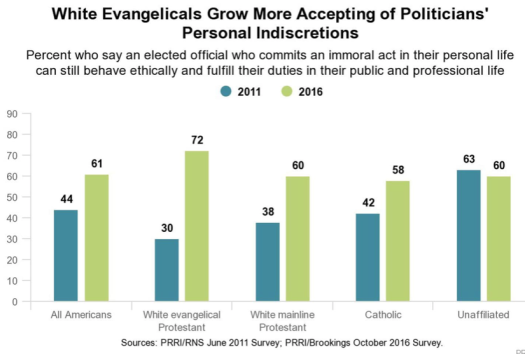I suppose some people were surprised to see heavily Catholic Ireland vote overwhelming in favor of legal abortion. But they really shouldn’t have been. Religion plays almost no role in politics, in Ireland, in America, and in Saudi Arabia. It’s simply not a factor.
Readers of the Washington Post should not have been surprised to learn that White Evangelicals are the least likely group to support providing shelter to desperate refugees from troubled countries:
In February 2017, as debate raged nationally over President Trump’s decision to curtail immigration to the United States, the conservative Christian Broadcasting Network dipped into the Bible to share what that sacred text said about refugees.
“Treat refugees the way you want to be treated,” it said, quoting Leviticus. “Invite the stranger in” (Matthew) and “Open your door to the traveler” (Job).
The first comment in reply to the article captures the tone of the rest of the feedback the site received: “Shame on CBN for this very poorly written article full of political rhetoric. This is not a Biblical issue.”
 Nor should people be surprised to learn that the leader of the conservative Southern Baptists was a strong supporter of abortion rights, back in 1970. Why shouldn’t he have supported abortion rights? After all, religion plays no role on politics.
Nor should people be surprised to learn that the leader of the conservative Southern Baptists was a strong supporter of abortion rights, back in 1970. Why shouldn’t he have supported abortion rights? After all, religion plays no role on politics.
Some readers may still have a nagging doubt about this claim. What about Saudi Arabia? It is a conservative Muslim country that does not allow women to drive. Except now they do allow women to drive. Is that because Saudi Arabia is no longer Muslim? Is it because of what the Koran says about women driving? Probably not.
So why are people confused on this point? Perhaps because they confuse “religion” with “cultural beliefs held by religious people.” And cultural views do play a big role in politics. In 1970, it was culturally acceptable to walk down the street in Tehran or Kabul wearing a miniskirt. Now it isn’t. In 2050?
OK, so why is my distinction important? Am I just splitting hairs? Even I agree that the cultural views held by religious people are an important factor in politics.
I would argue that if you think in terms of culture, rather than religion, it makes it much easier to understand poll number such as the following:
 If you naively thought that the political views of people reflected their religion, then you might be surprised by these numbers. Why would White evangelicals change their views so dramatically, in just a period of 5 years? Why would they have been horrified by the behavior of Bill Clinton, and then in 2016 suddenly decide that it didn’t matter if politicians had a sleazy personal life?
If you naively thought that the political views of people reflected their religion, then you might be surprised by these numbers. Why would White evangelicals change their views so dramatically, in just a period of 5 years? Why would they have been horrified by the behavior of Bill Clinton, and then in 2016 suddenly decide that it didn’t matter if politicians had a sleazy personal life?
In my view, these pollsters are wasting their time. They are trying to ascertain the views of voters on certain issues of principle, whereas most voters actually have no fixed principles. (I mean political principles, they may well be otherwise fine people.) They are guided by convenience, by expediency. However you wish to define religion, it’s certainly not supposed to be about convenience and expediency.
In this post, I’ve focused on conservative religious groups, but in this excellent Freddie deBoer post we learns that Social Justice Warriors are no different—lacking in principles. It would not surprise me in the least if 40 years from now conservative Christians are overwhelmingly pro-choice, supporters of “Me-Too” and welcoming to refugees, and SJWs are the exact opposite.
PS. The deBoer post (especially the second half), is also a brilliant explanation of the internal dynamics of China’s Cultural Revolution–and he doesn’t even mention China.
PPS. I’d like to see a Venn Diagram of the overlap between people who:
1. Agree with Jordan Peterson on the importance of character
2. Actually like Trump
PPPS. Ramesh Ponnuru makes a very persuasive case that someone in the Trump Administration is out to get him.
PPPPS. Some commenters recently suggested that the FBI had spied on the Trump campaign. If so, this is really odd:
Meanwhile, Democrats who attended a classified briefing about the informant with top DOJ officials last week said they saw “no evidence to support any allegation that the FBI or any intelligence agency placed a spy in the Trump campaign.” Top Republicans who also attended the briefing have remained silent, however.



